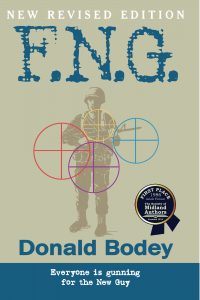The Black Soldier in Vietnam War Literature and Film (EXCERPT)
PERRY D. LUCKETT

F.N.G. Revised Edition
Donald Bodey develops a similar character and friendship in his Vietnam novel, F.N.G. (1985). Bodey’s narrator is a white man, Gabriel Sauers, who becomes friends with a black man soon after arriving in Vietnam. Sauers knows the man at first only as a fellow recruit, with a “hard-ass look . . . that is scary all by itself, like his head comes off and just floats in front of your face, defiant-like” (287). But the latter distinguishes himself quickly through a confrontation with a second lieutenant. When the black man refuses to come to attention in the barracks, the lieutenant calls him a “dumb black” and asks his name. He says: “Dumb black is pretty close, sir Smart-ass White. Just call me Black” (15). He’s restrained from punching the lieutenant by his barracks-mates, and from that time s on goes by the nickname of Callmeblack or, simply, Callme. In this scene, Bodey emphatically establishes Callme’s race and unwillingness to defer to white prejudice. Consequently, the black man’s developing relationship with the white narrator is based on mutual respect and need, rather than on social expectations of inferiority.
Two scenes reinforce this point, occurring after the men have shared hard work, long marches, and initial battle. Because of Callme’s physical strength and ability, he carries a heavy M-79 grenade launcher and extra grenades, which makes his inability to swim particularly treacherous during deep-river crossings. In one case, he falls into a deep pool, and Sauers saves him from drowning. Callme returns the favor during what will become Sauers’ last combat action, when he takes the white man’s place on point to crawl into vicious sniper fire. Although Callme survives this part of the mission, he steps onto a mine and loses his legs in the explosion. Sauers’ reaction is so intense that he “freaks out” and is removed permanently from the war because of battle fatigue. A tough, unremitting narrative of suffering, friendship, and compassion, F.N.G. clearly illustrates the esteem which many Vietnam veterans share for the black combat soldier.
The preceding works hint at the ambivalent position of black soldiers in Vietnam. Initially, Blacks often found a special pride in being “the meanest, baddest motherfuckers in the valley. As Wallace Terry points out, before the Tet offensive most Blacks were volunteers, and their high proportion of fatalities stemmed more from their own courage, aggressiveness, and desire to carry an extra burden in combat than from prejudicial actions by commanders (Terry, Florida Times 3). In the later years of the war, however, many more black soldiers were discontented with being drafted and having to fight a war against their brown brothers of the Third World. As Erwin Parson points out in an article on black Vietnam veterans, these men frequently identified with the Vietnamese people, whom they viewed as remarkable survivors of poverty and war-much like Blacks who had survived an economic and class war at home (365-66). Thus, in narratives set after the 1968 Tet offensive, relationships with white soldiers become more complex and often, more costly to the black soldier’s psyche.


